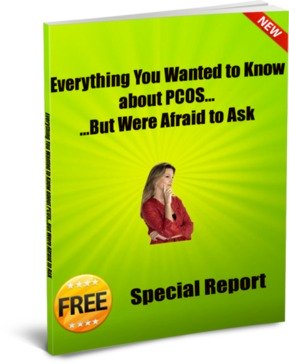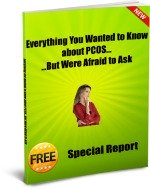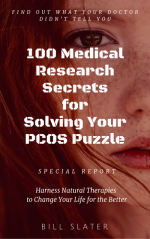PCOS and Your Body Clocks -- There's No Pill for This
Wouldn't it be great if you could just pop a pharmaceutical pill that would make PCOS go away?
Well, there isn't any such pill now and I'm not sure there ever will be.
I say this because I've been doing more research into polycystic ovary syndrome as I try to write a new book about it. The more I try to understand the causes and possible solutions to this disease, the more complex and murky it all is.
Moreover, why is this disorder so stubborn and difficult to treat? Chances are, you've tried nearly everything -- birth control pills, hCG diets, working out at the gym 7 days a week, antidepressants, ant oil, meditation, whatever. You may have experienced some improvement -- but yet PCOS just keeps hanging around.
I think the reason it's so difficult is that there are so many factors that contribute to the disease. If you miss dealing with any important factor, you'll get disappointing results, no matter how hard you try.
The second reason is that it's an oversimplification to view PCOS as a separate disease, something entirely distinct from every other disease. PCOS is not solely a disorder of the ovaries. It's much more systemic than that.
I say this because my best friend was diagnosed with pancreatic cancer. 95% of people with this diagnosis are dead within 5 years. So I've been taking a lot of time off to do research on this disease and try to help my friend find ways to try to slow it down.
One of the things I discovered is that there is quite a bit of overlap between PCOS and pancreatic cancer, in terms of causal factors and processes going on in the body. Don't worry! -- this does NOT mean you will get pancreatic cancer. It only means that there are common elements operating in various diseases that seem unrelated to each other. So if you can control these common elements, you can not only control PCOS but you also minimize risk of developing other diseases like diabetes, heart disease, Alzheimer's, cancer and so forth.
There's no room here to talk about all the factors you need to be thinking about. But let's very briefly mention just one of them.
It's your body's daily rhythm, also known as "body clock" or "circadian rhythm".
Is Your Body Clock on Time?
Circadian rhythms are physical, mental and behavioral changes that follow a roughly 24-hour cycle, responding primarily to light and darkness in an organism's environment. They are found in most living things, including animals, plants and even tiny microbes.
These rhythms are managed by little "molecular clocks" throughout your tissues.
The central clock is the suprachiasmatic nucleus (SCN), located in your hypothalamus gland, which is in your brain. This is the "pacemaker" for the body and is governed by the day-night cycle. When this clock is out of sync, you will have jet lag when you fly from San Francisco to Paris. Or you might get "seasonal affective disorder" in the winter or summer but not feel depressed at other times of the year.
Also, you have additional molecular clocks in your skin, your organs, and in other tissues. These peripheral clocks are regulated by various factors, of which feeding/fasting is perhaps the most important. So eating at odd times or consuming a diet high in unhealthy fats and sugars will desynchronize these peripheral clocks.
So if you have a pint of ice cream at midnight, your peripheral clocks go out of sync with your central pacemaker clock. When your clocks are out of sync for an extended time, obesity, diabetes, cardiovascular and other metabolic disorders can develop.
Imagine how confused you would be if every clock in your house displayed a different time. You would feel confused and be inefficient. That's what happens inside your body when your internal clocks are out of sync. It's super-important that you keep all your clocks in synch and in a natural rhythm.
And let's not forget the hormone melatonin, 75% of which is produced only during darkness by the pineal gland in your brain. A University of Texas study has reported: "Both stable circadian rhythms and cyclic melatonin availability are critical for optimal ovarian physiology and placental function."
In other words, your reproductive system can't work the way it's supposed to if the rhythm of your clocks is messed up, and if your melatonin production is impaired. Melatonin is every bit as important for controlling PCOS problems as testosterone, insulin, estrogen, progesterone or any other hormone you're familiar with.
Here's the bottom line: Effective management of PCOS must include restoration of your natural circadian rhythms. This is not optional. It is required.
OK, what to do? Here are a few tips.
- Go to bed earlier. Ideally, from a body clock point of view, you would be thinking about going to bed as soon as it is completely dark outside. I know this sounds impossible. But give it a good try.
- Think about getting up as soon as it's light outside.
- Change your dietary fats as we describe in our PCOS diet ebook. Also, the fatty acids in fish oil are beneficial to your circadian rhythm.
- Sugars and refined carbs disrupt your molecular clocks. Avoid!!
- Don't eat late at night.
- Keep your sleep patterns the same on both weekdays, and weekends.
- Make sure your bedroom is completely dark.
- Turn off electronic devices after dark, including smart phone, TV, computers, etc. These devices put out a type of blue light that is disruptive your circadian rhythm. If you must view these devices at night, wear yellow-tinted glasses.
- During the day, expose major areas of skin to the open air and daylight.
Whew! I haven't covered even 20% of what I had hoped to say. I haven't talked about cortisol and your daily rhythm, or about the adverse effect of man-made electromagnetic and other types of radiation. And more. We'll visit these other topics soon.
I can only say that we're all now living in a totally unnatural environment of our own creation. Tens of thousands of research studies have shown that this altered environment is exacting a heavy toll on our health, and on our ability to regain our health if we have lost it.
I can only say that we're all now living in a totally unnatural environment of our own creation, which is having an effect on PCOS. Tens of thousands of research studies have shown that this altered environment is exacting a heavy toll on our health, and on our ability to regain our health if we have lost it.
Sources:
McClung CA, How might circadian rhythms control mood? Let me count the ways. Biol Psychiatry. Aug 15, 2013; 74(4): 242249.
Oosterman JE et al. Impact of nutrients on circadian rhythmicity. Am J Physiol Regul Integr Comp Physiol. 2014 Dec 17. [Epub ahead of print]
McFadden E et al. The relationship between obesity and exposure to light at night: cross-sectional analyses of over 100,000 women in the Breakthrough Generations Study. Am J Epidemiol. 2014 Aug 1;180(3):245-50.
Reiter RJ et al. Melatonin and the circadian system: contributions to successful female reproduction. Fertil Steril. 2014 Aug;102(2):321-8.
Greco JA et al. Differential effects of omega-3 fatty acid docosahexaenoic acid and palmitate on the circadian transcriptional profile of clock genes in immortalized hypothalamic neurons. Am J Physiol Regul Integr Comp Physiol. 2014 Oct 15;307(8):R1049-60.
Return to
PCOS Health Review
This free newsletter gives you original and immediately usable information to help you deal with PCOS.
Get the latest research, tips for improving your health, answers to questions, success stories, and more!
Your e-mail address is totally secure. We will never misuse your information.
Enter Your Email Above to Subscribe Today
and Get Your Questions Answered in this Free Special Report!





